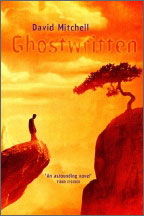 |
 David Mitchell
David Mitchell
Ghostwritten
Reviewed by: Nazalee Raja © 2005
Sceptre, Hodder and Stoughton
UK Trade paperback
ISBN: 0 340 73975 4
436 Pages; £7.99
Publication date: 20 April 2000
Vintage
US Trade Paperback
ISBN: 0 375-72450-8
448 Pages ; Price: $14.00
Publication date: 20 April 2000
Date Reviewed: 31 January 2005
Index:
General Fiction
Fantasy
Science Fiction
Part of the joy of reading, for me, comes from the perspective books provide on what it feels like to be someone else, to step into another person's shoes for the length of time it takes for the story to unfold. This is especially true when an account is written in the first person, placing us inside the narrator's head. Once there, we follow their reasoning and logic, experiencing first hand their thought processes, knowing what it is to think just as they do. A great insight.
Ghostwritten is an accomplished debut novel by rising literary talent, David Mitchell, shortlisted for the 2004 Booker Prize for his third novel, Cloud Atlas. In Ghostwritten, Mitchell gives us the opportunity to step into the minds of not one, but seven different characters.
The book consists of seven separate and distinct short stories told in the first person, and one in the form of a radio transcript. Each story is discrete and complete in itself, told from the view point of a different narrator, immersing us fully in the world of that character and bringing their world to life. At the same time, each short story also relates in some way to one or more of the other stories, giving us an interlinked and cohesive whole.
Just as the stories are distinct and individual, likewise the narrators vary. A delusional Japanese terrorist trying to evade capture, a confused British ex-patriot searching for solutions, an indomitable Chinese tea-shack owner trying to survive, and an indefinable nameless entity searching for meaning and identity are examples of the diverse characters whose minds we enter. Each time we begin a new story, the style and language of the prose alters to reflect the change of narrator, so that each character has an authentic voice. The internal monologue we read is always appropriate to that person, the words they would use and the way they would use them, placing us fully in their life and way of thinking, whilst also sweeping us along with the story they have to share.
Mitchell's perceptive characterisation leaves the novel peopled with fully developed, three-dimensional characters, complete with realistic faults and blind-spots, as well as endearing qualities. The reader may not like these people, but they are always believable. The reader may disagree with a character's choices, as with any friend or acquaintance, but will not doubt the plausibility of those choices. We would not doubt, for example, that naive Russian art thief, Margot, would dream of escaping a gangster-run world, or that principled Irish scientist, Mo, would rebel against the unethical use of her genius.
While each short story can stand alone, they also simultaneously interlink, either by some event or characters in common. Some of these links are small and seem incidental, such as a phone call which occasions a chance encounter; others are more dramatic and obviously life changing, such as one character saving the life of another.
Some readers may feel that some of the links within the book are forced and artificial, written in solely to create a "unified" whole as opposed to disparate short stories. In response, I would argue that this ingenious approach to style and structure serves two purposes; it serves not only to create a vital and engaging novel, but also skilfully highlights its main theme - namely that we may all be distinct individuals, small islands unto ourselves, but our lives are invariably affected by the actions of others. Actions and incidents far removed from our lives can impact on us in unforeseeable ways and with unpredictable consequences, sometimes altering the very course of our lives; a literary illustration of the "Butterfly Effect".
As each character analyses the consequences of their actions and choices, the reader makes a parallel journey and reaches their own conclusions. These are likely to be influenced by the resolution of the final short story; an insight into a possible future. The novel ends where it began, an apt circularity displaying an ability to segue from the general to the particular, demonstrating that moral decisions are made on various levels with specific consequences for the individuals involved.
The sparkling, original prose combine with well-observed dialogue and tense, engaging plot-lines. The minutiae of setting and location are evocatively conveyed with the clarity and precision of a local resident - quite a feat considering the number and variety of settings. The overall effect is to give the reader a clever literary novel which is thought-provoking but remains accessible and extremely readable. It achieves the rare feat of being an intelligent page-turner which stays with the reader long after the final page.
|
 |
